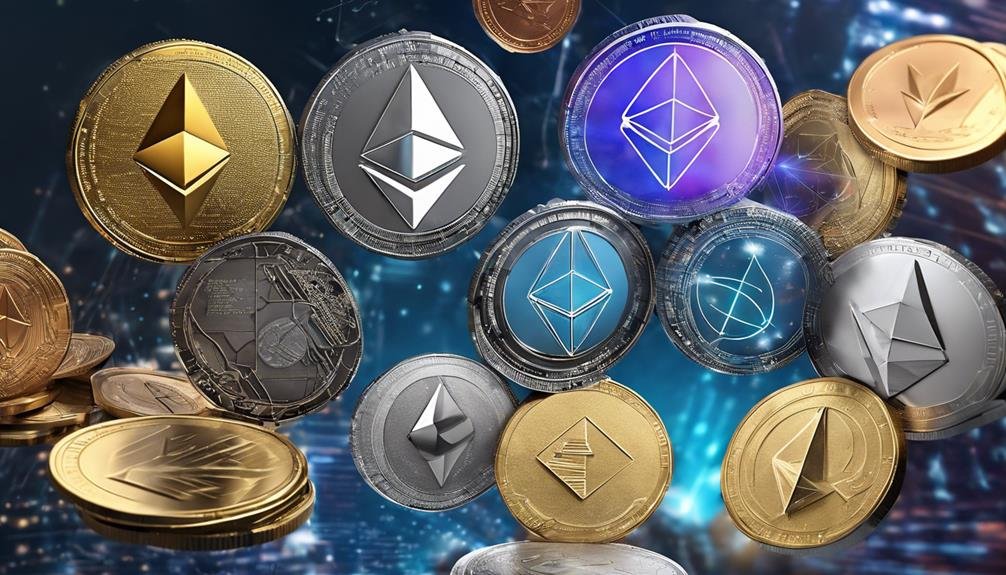As you dip your toes into the vast sea of altcoins, you’ll find that these digital assets hold the potential to reshape the future landscape of the economy. The intricate dance between traditional currencies and these emerging alternatives hints at a transformation waiting to unfold. Stay tuned as we explore how altcoins wield their influence in catalyzing a digital revolution that transcends the boundaries of conventional finance, offering a glimpse into what lies ahead for tomorrow’s economic horizons.
Key Takeaways of Altcoins Role In Shaping Tomorrows Digital Economy
- Altcoins drive financial innovation and experimentation.
- Altcoins enhance financial inclusion through diverse functionalities.
- Altcoins mitigate risk through investment diversification.
- Altcoins pave the way for a decentralized and transparent digital economy.
Altcoins: Diversifying Investment Portfolios

When diversifying investment portfolios, altcoins offer investors unique opportunities to spread risk and enhance returns through exposure to various cryptocurrencies with distinct features and use cases. Altcoins provide diversification opportunities by catering to specific niches in the market. For example, Ripple focuses on cross-border payments, while Ethereum specializes in smart contracts.
By investing in altcoins, individuals can spread risk across different cryptocurrencies, reducing the impact of volatility on any single asset. While altcoins come with higher risks due to their volatility and lower liquidity than Bitcoin, they are vital in driving innovation within the cryptocurrency industry. These digital assets offer tailored protocols for specific sectors, encouraging advancements and adaptations that contribute to the overall growth and evolution of the industry.
Embracing altcoins expands investment horizons and supports the continuous development and refinement of cryptocurrency technologies.
Altcoins: Driving Innovation in Finance
Altcoins propel financial innovation by pioneering unique features and technologies that extend beyond the capabilities of Bitcoin. These cryptocurrencies serve as testbeds for new financial applications, pushing the boundaries of traditional financial systems. Through specialized services like faster transactions and enhanced security, altcoins contribute to the evolution of decentralized finance (DeFi).
By introducing new protocols and functionalities, altcoins play a vital role in shaping tomorrow’s digital economy. They cater to specific financial needs, offering a diverse range of possibilities in finance. Altcoins drive innovation and foster a dynamic environment where experimentation and creativity thrive. Their impact on the financial landscape is profound, as they pave the way for a more inclusive and efficient financial ecosystem.
As altcoins evolve, their influence on finance will grow stronger, leading the digital economy toward a more advanced and interconnected future.
Altcoins: Fostering Financial Inclusion

In fostering financial inclusion, altcoins like Ripple (XRP) and Stellar (XLM) are essential in enabling affordable cross-border transactions for individuals and businesses globally. These altcoins provide cost-effective financial solutions through low transaction fees, making them ideal for underbanked populations seeking access to digital financial services. Additionally, stablecoins such as Tether (USDT) and USD Coin (USDC) offer a stable store of value, particularly beneficial in regions with volatile fiat currencies, promoting financial stability and inclusivity.
Altcoins focuses on micropayments, like Electroneum (ETN) and Nano (NANO), which facilitate small-value transactions, enhancing financial interactions and inclusion in the digital economy. Besides, decentralized Finance (DeFi) altcoins such as Compound (COMP) and Aave (AAVE) introduce innovative lending and borrowing opportunities, empowering individuals without traditional banking access to actively participate in the financial ecosystem.
- Altcoins enable affordable cross-border transactions.
- Stablecoins provide a stable store of value.
- Altcoins with low transaction fees offer cost-effective financial solutions.
- Altcoins focusing on micropayments facilitate small-value transactions.
- DeFi altcoins offer innovative lending and borrowing opportunities.
Altcoins: Navigating Market Volatility
Handling market volatility with altcoins requires a strategic approach rooted in understanding their unique features and the impact of market fluctuations on investments. Altcoin investments are subject to market volatility, making risk management strategies essential for investors. Stablecoins, a type of altcoin pegged to stable assets, aim to stabilize the volatile crypto market. To navigate market fluctuations effectively, investors must comprehend the factors influencing altcoin volatility.
These factors include market demand, regulatory changes, technological developments, and investor sentiment. With their diverse features and use cases, Altcoins play an essential role in shaping tomorrow’s digital economy by driving innovation in finance and technology. By employing sound risk management practices and staying informed about market dynamics, investors can better position themselves to capitalize on the opportunities presented by altcoins while mitigating the risks associated with market volatility.
Altcoins: Paving the Way for Decentralization

Pioneering the path towards decentralization, alternative cryptocurrencies are reshaping the digital landscape with innovative features and functionalities. Altcoins play a pivotal role in promoting decentralization by offering a variety of features and use cases beyond Bitcoin. Here are five key ways altcoins are paving the way for devolution:
- They provide a breeding ground for innovation and experimentation in blockchain technology, driving the development of new applications and functionalities.
- Altcoins challenge traditional financial systems by facilitating decentralized and transparent transactions, catering to a broader user base.
- By implementing specialized protocols and functionalities, altcoins are revolutionizing the financial industry, promoting inclusivity, and expanding access to novel financial products.
- Altcoins like Ethereum, Ripple, and Litecoin are tailored for specific use cases, enhancing the expansion of blockchain technology and contributing to overall industry growth.
Altcoins are at the forefront of reshaping the digital economy toward a more decentralized and inclusive future.
Frequently Asked Questions
How Are Cryptocurrencies Currently Being Used in the Digital Society Economy?
In the digital society economy, cryptocurrencies are revolutionizing online transactions, offering investment opportunities, diverse payment methods, decentralized finance through smart contracts, cross-border payments, asset diversification, peer-to-peer lending, micropayments, and tokenization benefits.
What Is the Purpose of Altcoins?
In the digital economy, altcoins serve varied purposes beyond Bitcoin, such as faster transactions, improved security, and specialized applications. They offer innovations like privacy features, scalability solutions, and smart contracts, contributing to market competition and investment potential.
Which Crypto to Buy for the Next Bull Run?
For the next bull run, consider top picks based on market analysis. Develop an investment strategy with price predictions, risk assessment, and growth potential in mind. Seek trading opportunities, track market trends, diversify your portfolio, and manage market volatility.
What Is the Future of Altcoins?
In the future of altcoins, regulatory challenges, adoption hurdles, market volatility, institutional interest, scalability solutions, privacy concerns, interoperability issues, decentralized finance, token utility, and community governance will shape their trajectory in the evolving digital economy.
Conclusion
To sum up, altcoins play a vital role in shaping tomorrow’s digital economy by diversifying investment portfolios, driving innovation in finance, fostering financial inclusion, steering market volatility, and paving the way for decentralization. With their unique features and use cases, altcoins offer a dynamic and inclusive ecosystem that is essential for the growth and stability of the cryptocurrency market. Embracing altcoins is vital to staying ahead in the ever-evolving landscape of digital assets.










